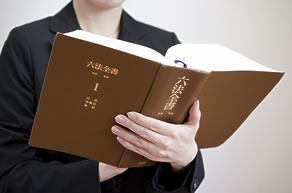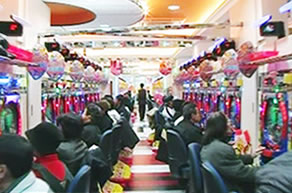What Is the Entertainment Businesses Law?
The pachinko parlor business is a type of entertainment business as stipulated by the “Act on Control and Improvement of Amusement and Entertainment Business.” This Act is referred to by several abbreviated names such as the Entertainment Business Law, the Adult Entertainment Law, and the Amusement Businesses Law among others, though it shall be hereinafter referred to as the Entertainment Business Law.
The Entertainment Business Law prescribes regulations for businesses which provide entertainment services concerning gambling such as pachinko, pachislo, game centers and mah-jongg parlors and restaurants with entertainment services such as barrooms and cabarets as well as adult entertainment shops, or so-called fu-zoku shops. The types of businesses regulated by this law are generally operated for adults. This law regulates these businesses so that they do not interfere with the healthy development of minors and to retain good local morals and a moral environment in terms of various aspects such as business licenses, shop locations, facility structures, operating hours, etc.
 In addition, the Entertainment Business Law consists of not only the act but also related laws and regulations including the “Cabinet Office Ordinance on Attached Documents to Apply for a License under the Act on the Control and Improvement of the Amusement and Entertainment Business” (hereinafter referred to as the “Cabinet Office Ordinance”), the “Ordinance for Enforcement of the Act on the Control and Improvement of the Amusement and Entertainment Business” (hereinafter referred to as the “Ordinance for Enforcement”), the “Regulations Concerning the Control and Improvement of the Amusement and Entertainment Business (hereinafter referred to as the “Regulations for Yugiki (game machines)”) and the “Standard of Interpretation and Operation of the Regulations Concerning the Certification and Official Inspection of Game Machines” (hereinafter referred to as the “Operational Standard”) as well as the “Order for Enforcement of the Act on the Control and Improvement of the Amusement and Entertainment Business” (hereinafter referred to as the “Enforcement Order”). The act sets forth only general rules; the Enforcement Order regulates regions where relevant business is permitted to be operated and operating hours, etc.; the Cabinet Office Ordinance sets forth various documents to be submitted; the Ordinance for Enforcement sets forth detailed rules; and the Operational Standard specifically sets forth matters not covered by the laws and regulations. The Regulations for game machines set forth the performance of game machines that can be used for operation of a pachinko parlor (including pachinko machines and pachislo).
In addition, the Entertainment Business Law consists of not only the act but also related laws and regulations including the “Cabinet Office Ordinance on Attached Documents to Apply for a License under the Act on the Control and Improvement of the Amusement and Entertainment Business” (hereinafter referred to as the “Cabinet Office Ordinance”), the “Ordinance for Enforcement of the Act on the Control and Improvement of the Amusement and Entertainment Business” (hereinafter referred to as the “Ordinance for Enforcement”), the “Regulations Concerning the Control and Improvement of the Amusement and Entertainment Business (hereinafter referred to as the “Regulations for Yugiki (game machines)”) and the “Standard of Interpretation and Operation of the Regulations Concerning the Certification and Official Inspection of Game Machines” (hereinafter referred to as the “Operational Standard”) as well as the “Order for Enforcement of the Act on the Control and Improvement of the Amusement and Entertainment Business” (hereinafter referred to as the “Enforcement Order”). The act sets forth only general rules; the Enforcement Order regulates regions where relevant business is permitted to be operated and operating hours, etc.; the Cabinet Office Ordinance sets forth various documents to be submitted; the Ordinance for Enforcement sets forth detailed rules; and the Operational Standard specifically sets forth matters not covered by the laws and regulations. The Regulations for game machines set forth the performance of game machines that can be used for operation of a pachinko parlor (including pachinko machines and pachislo).
Furthermore, each prefecture prescribes its own Regulations for Enforcement of the Act on the Control and Improvement of the Amusement and Entertainment Business (hereinafter referred to as the “Enforcement Regulations”) and Prefectural Regulations for Enforcement of the Act on the Control and Improvement of the Amusement and Entertainment Business (hereinafter referred to as the “Prefectural Ordinance for Enforcement”). Accordingly, the Entertainment Business Law grants discretion to each region.
How Is the Operation of Pachinko Parlors Regulated?
How is the operation of pachinko parlors specifically regulated by the above laws and regulations? A business license is regulated in the following two regards. A business operator and a parlor, and a public safety commission of each prefecture that has jurisdiction over the location of a parlor, decides on whether to grant a license to a business operator. These public safety commissions examine whether a business operator falls under a narcotic addict or an entity associated to an organized crime group, etc., whether the location of a parlor is within the region prescribed in the Enforcement Regulations, or whether the structure and facilities of the parlor conforms to the standard as set forth in the Ordinance for Enforcement, etc., and grants a license only to those business operators who clear the above examination. Parlor facilities include game machines. Moreover, standards for prizes are provided have also been established as some prize provision methods to customers may significantly increase their passion for gambling.
 A business operator must comply with a number of regulations after the commencement of operations. The laws and regulations set forth rules that should be complied with by business operators including operating hours, the brightness of lighting, noise and vibrations, advertisements and publicity, etc., in addition to the maintenance of structures and facilities. A business operator is also required to obtain approval of the public safety commission in each prefecture where the business operator intends to expand operations or modify facilities (including the replacement of game machines) with the exception of minor modifications. Game machines installed in a parlor are also regulated by the basic provision that “Game machines that may significantly stimulate the desire of customers to gamble shall not be installed or operated.” The aforementioned Regulations for game machines prescribes rules for the development of new types of machines by game machine manufacturers in terms of dedama (balls won by players) performance, technical intervention, and countermeasures for illegal alteration, etc.
A business operator must comply with a number of regulations after the commencement of operations. The laws and regulations set forth rules that should be complied with by business operators including operating hours, the brightness of lighting, noise and vibrations, advertisements and publicity, etc., in addition to the maintenance of structures and facilities. A business operator is also required to obtain approval of the public safety commission in each prefecture where the business operator intends to expand operations or modify facilities (including the replacement of game machines) with the exception of minor modifications. Game machines installed in a parlor are also regulated by the basic provision that “Game machines that may significantly stimulate the desire of customers to gamble shall not be installed or operated.” The aforementioned Regulations for game machines prescribes rules for the development of new types of machines by game machine manufacturers in terms of dedama (balls won by players) performance, technical intervention, and countermeasures for illegal alteration, etc.
As stated above, a pachinko parlor provides entertainment services for adults within the scope of various standards prescribed by the Entertainment Business Law and related laws and regulations and ordinances.